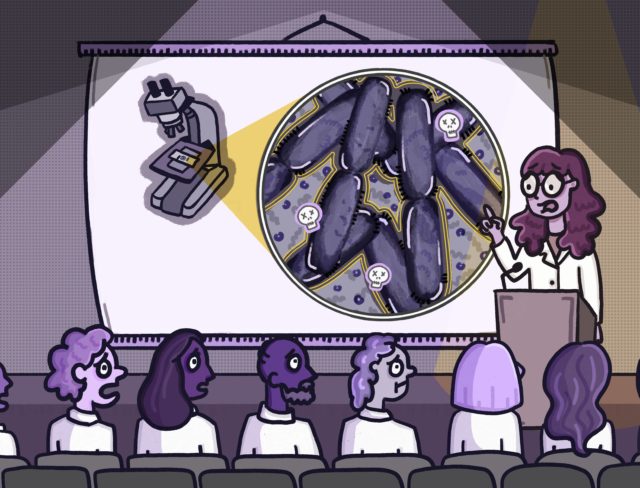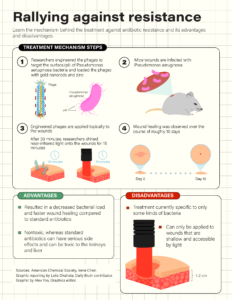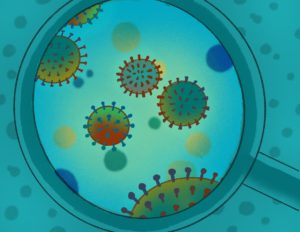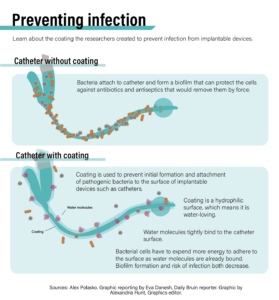This post was updated Feb. 27 at 7:43 p.m.
The rise of antibiotics is one of the greatest contradictions of our time.
Antimicrobials save millions of lives. They are both a marvel of modern medicine and the driver of one of the largest threats to global public health in this century.
Antimicrobial resistance allows bacteria, viruses, fungi and parasites to thwart medicines designed to eliminate them. A growing inability to use these valuable tools to treat illnesses has led us into a silent pandemic, as pathogens with AMR have sparked widespread increases in contagion, severe illness, disability and fatal occurrences.
Growing up, I only had one thought regarding antibiotics: they made you feel better. Like many, I have sat anxiously in a doctor’s waiting room wanting nothing more than a prescription for medication that would eliminate the ache in my throat. It never occurred to me that there may be greater consequences to taking antibiotics.
The overuse and misuse of antibiotics are impeding the medical community’s ability to treat common infections and perform life-saving procedures.
It is not just the future of modern medicine that hangs in the balance. Resistant bacteria and fungi threaten agriculture, veterinary medicine, the ability to perform complex surgeries and the economy.
Prior to taking a Society and Genetics class this quarter, I had never heard of AMR. I felt naïve and ignorant in the first few lectures as I listened to the professor discuss how common medications that I had been relying on my whole life are becoming nonviable as forms of treatment.
It made me wonder why I had not heard of AMR in high school or in any other college courses thus far. Surely a public health threat that carries such large consequences must be emphasized in scientific education.
Yet, my own experience has shown me that this is not the case. The need for greater awareness of AMR in scientific education is evident.
“I was immediately scared by the whole concept and realized that this is something that people should know about,” said Amanda Andres, a second-year physiological science student.
AMR is an evolutionary process in pathogens catalyzed by the misuse of antimicrobials to treat, prevent and control infections. The science behind AMR lies in horizontal gene transfer, which allows harmful germs to spread their resistant genes to other pathogens. These genes can be passed on through various forms of direct contact so that even if a patient has never even been treated with a specific antibiotic, they still might possess resistant genes.
Resistant genes are then able to change the target receptors by decreasing the affinity of the drug, deactivating the antibiotic, limiting the uptake of the antibiotic or pumping out the antibiotic entirely. This issue is intensifying for gram-negative bacteria, which have very thin cell walls that make it very difficult to absorb antibiotics. Gram-negative bacteria also develop resistance genes at an increasingly concerning rate.
“It’s kind of like the race against time,” said Kyson Kono, a third-year philosophy transfer student. “The next thing you know, simple meds aren’t working anymore.”
Hannah Landecker, a professor with a joint appointment in the UCLA Department of Sociology and the UCLA Institute for Society and Genetics, analyzed the AMR pandemic and the influential role that antimicrobial medicines have on the proliferation of resistance genes.
“There are all these unexpected places where these very biologically powerful agents are being used in large quantities, in ways that don’t really have to do with individuals making choices,” Landecker said. “It’s more to do with who’s aware, who’s surveilling it, who’s regulating it and how does it work?”
Rather than focusing the entirety of our efforts on individual actions and behaviors, Landecker added that the issue is best addressed through communal societal change, as it would be difficult for everyone to make this their number one priority.
“You have to find the people who want to care, and who want to learn to do something,” Landecker said.
According to a 2019 study, bacterial AMR was the direct cause of 1.27 million deaths worldwide and indirectly responsible for an additional 4.95 million deaths globally. Those numbers are frightening, and unfortunately, only likely to increase.
In 2015, the World Health Assembly developed a global action plan to address the distressing AMR developments that 178 countries later aligned with.
Olivia Katz, an administrative assistant for the OB-GYN clinic at UCLA Health, said society will end up in a vicious cycle where viable solutions for both current and new diseases never get discovered. The resistance genes will just continue to accumulate in the microbiome.
At an individual level, preventing the overuse and misuse of antibiotics is imperative to combating AMR. Eating fewer animal products with high amounts of antibiotics in them and refraining from taking antibiotics unnecessarily or improperly can collectively interfere with the spread of AMR.
“Even if you’re feeling better, you want to finish it (antibiotics) out so that none of the bacteria or viruses are able to get resistance,” Katz said.
Both the broader and universal aspects of AMR are concerns for countries of all socioeconomic statuses. Pathogens with resistance do not distinguish between national borders or individual traits such as race, ethnicity, gender or religion.
This is not to conclude that antibiotics cannot be immensely beneficial among countless industries including medicine, agriculture and sanitation practices. The world is aware of the advantages of antimicrobial products. However, the consequences of antimicrobial agents are less widely discussed, especially when they are no longer used in moderation.
“We know what it was like before antibiotics, and there is concern that antimicrobial-resistant pathogens will rise again in ways that we really don’t want to see,” Landecker said.
It will take a collective, global effort of the human race working with, not against, the public health community and medical professionals to ensure the use of antibiotics can still inspire medical miracles, rather than being the cause of our destruction.






Comments are closed.